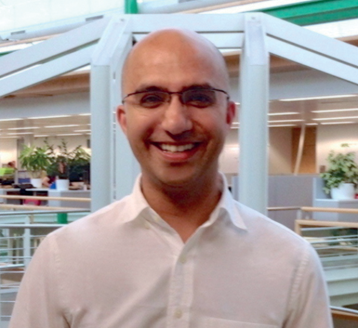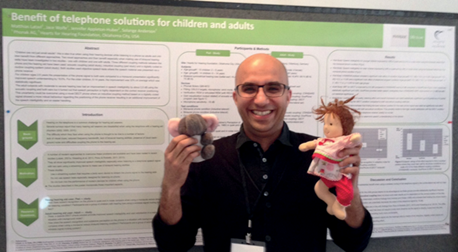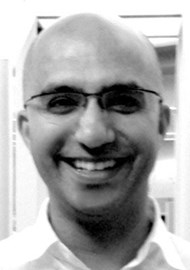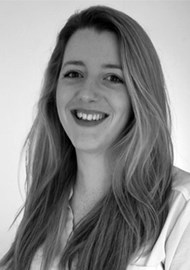Alex Griffiths-Brown chats with Dr Gurjit Singh about his career so far, aims for his time as President of the Canadian Academy of Audiology and his recently developed admiration for Andre Agassi…

Dr Gurjit Singh.
Tell us about your background, how did you become involved in audiology?
Well it was somewhat circuitous. After completing an undergraduate degree in psychology, I entered into a combined Masters and PhD program in Social Psychology at the University of Waterloo. Although the training was excellent, the program itself focused on understanding basic theory and was very experimental in nature. Since I was interested in pursuing studies that were more applied, I left the University with a Master’s Degree. Around this time, I also started to notice that my ears would ‘ring’ after exposure to loud music and this led me to be more curious about my hearing. I soon learned that there was an entire field dedicated to the assessment and treatment of impaired hearing and began my audiology degree at the University of Western Ontario where I completed a Master’s Degree. After working briefly, I completed a PhD at the University of Toronto in the Department of Psychology. Interestingly, I had previously promised myself that I would never again darken the doors of a psychology department, but of course, the allure of training under Prof Kathy Pichora-Fuller was too tempting.
How do you feel your experience in the field of psychology impacts on your practice within the audiology field?
Through my research and education, I arrived at the conclusion that technology alone is unable to fully compensate for the communication difficulties that accompany hearing loss and ageing. Ultimately, hearing instrument technology must work in concert with an individual, and by definition, this requires an appreciation of the many things that make us human. Hence, I endeavour to better understand the roles of ageing, cognition, emotion, and social psychology when assessing and treating impaired hearing.
Is there anyone who has inspired you throughout your career and why?
There are so many researchers, colleagues, clinicians, and hard-of-hearing clients and their family members who have been sources of inspiration over the years. I’m truly blessed to get to work in this field! That said, it would be a disservice if I did not specifically draw attention to the contributions of three sources of inspiration. The first is Prof Richard Seewald who serves as a model for how one should conduct themselves in our profession. The second is Prof Pichora-Fuller who provided foundational training and guidance during my PhD. The last consists of mentors and colleagues at Sonova, including Drs Stefan Launer, Michael Boretzki, and Ulrike Lemke. This group is brilliant, incredibly motivated to help those with communication difficulties, and both motivate and challenge me to push ideas and to not be satisfied with the status quo.
What do you hope to achieve during your year as Canadian Academy of Audiology president? Is this something that you had always aspired to?
Not at all! Prior to my term as President, I was volunteering as a Board Member because I saw it as an opportunity to give back to a field that has given me so much. It was during this time that our well-deserving President-elect was unable to continue onto the Presidency, and I was asked to step in. Over my term, my two goals are to continue to develop our world class conference (which next takes place in scenic Niagara Falls, Oct 21-24, 2015) and to develop a working group designed to initiate and support the efforts to increase uptake of hearing healthcare in Canada.
What are the biggest challenges or opportunities for the audiology profession in Canada at the moment?
Sadly, newborn hearing screening has not been universally established across all provinces and territories in Canada and this is long overdue. The field has learned so much about the critical need to screen newborns, thanks in large part to the pioneering work of Brits Adrian Davis and John Bamford, and it is a goal of the Canadian Academy of Audiology to support efforts geared to its universal adoption in Canada.
Who outside the world of audiology do you most admire?
I’ll side-step this question, and instead answer who it is that I’ve come to admire. I recently read Andre Agassi’s biography (yes, the “Image is Everything” tennis player) and found myself admiring his capacity for self-reflection, humility, and transformative personal growth, despite the conditions of his childhood and the potential access to an ‘easy’ life made possible by wealth and celebrity.
What area of your work do you enjoy most? (Lecturing, research or clinical work?)
All provide enjoyment, but I what I love most is conducting research.
This edition of Audiology Matters is looking at hearing loss in middle-aged adults. Have you encountered this age range in your clinical or research work and do you perceive any differences between this patient group and older adults?
Although I have not personally conducted much research looking at hearing loss in middle-aged adults, it’s great to see that this topic is gaining attention. I’m particularly impressed with the work of Karen Helfer and her colleagues who have observed that the communication deficits experienced by middle-aged adults are also related to age-related changes in cognition, even at this ‘early’ age.
What are you working on at the moment?
There’s a number of exciting studies going on at the moment! Most notably, research in our lab has recently observed that hearing healthcare outcomes, such as hearing aid use and satisfaction, appear to be strongly dependent on the availability of a supportive and caring social network. Stay tuned for additional work in this area from our group!
Where do you feel the biggest need for research lies?
While the field has made tremendous advances, there is so much that needs to be further studied. In the near future, I think we will see much more work investigating how socio-emotional factors and health psychology can inform the delivery of quality hearing healthcare.
“When I travel for business, which is often, what I do to manage the absence
from my family is to bring along one of my daughter’s toys and send her
photos of our ‘adventures’ – it’s a lovely way to keep in touch.”
If you could make every audiologist read one book, what would it be and why?
This is Water by David Foster Wallace because it describes the difficulty of empathy and the challenge and critical importance of living a conscious and sympathetic life. One of my clinical supervisors at the University of Western Ontario stressed that as clinicians, although we may see 1000s of audiograms in our careers, behind each audiogram is a unique person with a complicated life and story. For me, this book reaffirmed this lesson.
When you’re not working, where can you be found? How do you relax?
If only there were more hours in a day! I love spending time and sharing meals with friends and love listening to This American Life. It is radio at its finest!
If you were sent to a desert island, what would be your three essentials? (and no life rafts or rescue equipment!)
Assuming that the basics such as food and shelter are readily available, my three essentials would be my wife Jessica, my daughter Penelope, and a solar-powered radio that hopefully can pick up the CBC (Canadian Broadcasting Corporation).
For more information about the Canadian Academy of Audiology and the upcoming 2015 Academy Conference visit:
https://canadianaudiology.ca
Interview conducted by Alex Griffiths-Brown.






